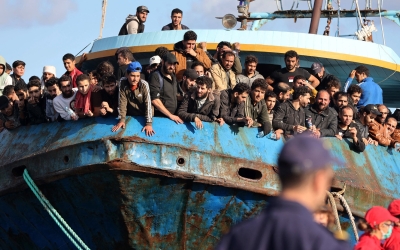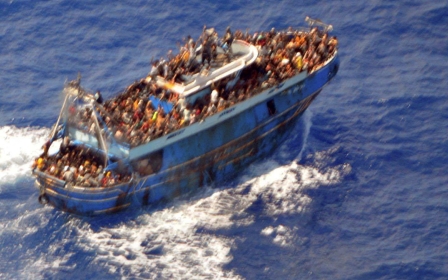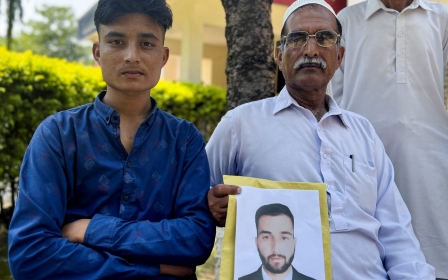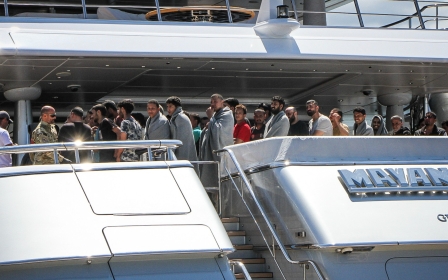Greece shipwreck: Trial of nine Egyptian men founded on 'fragile evidence' say activists
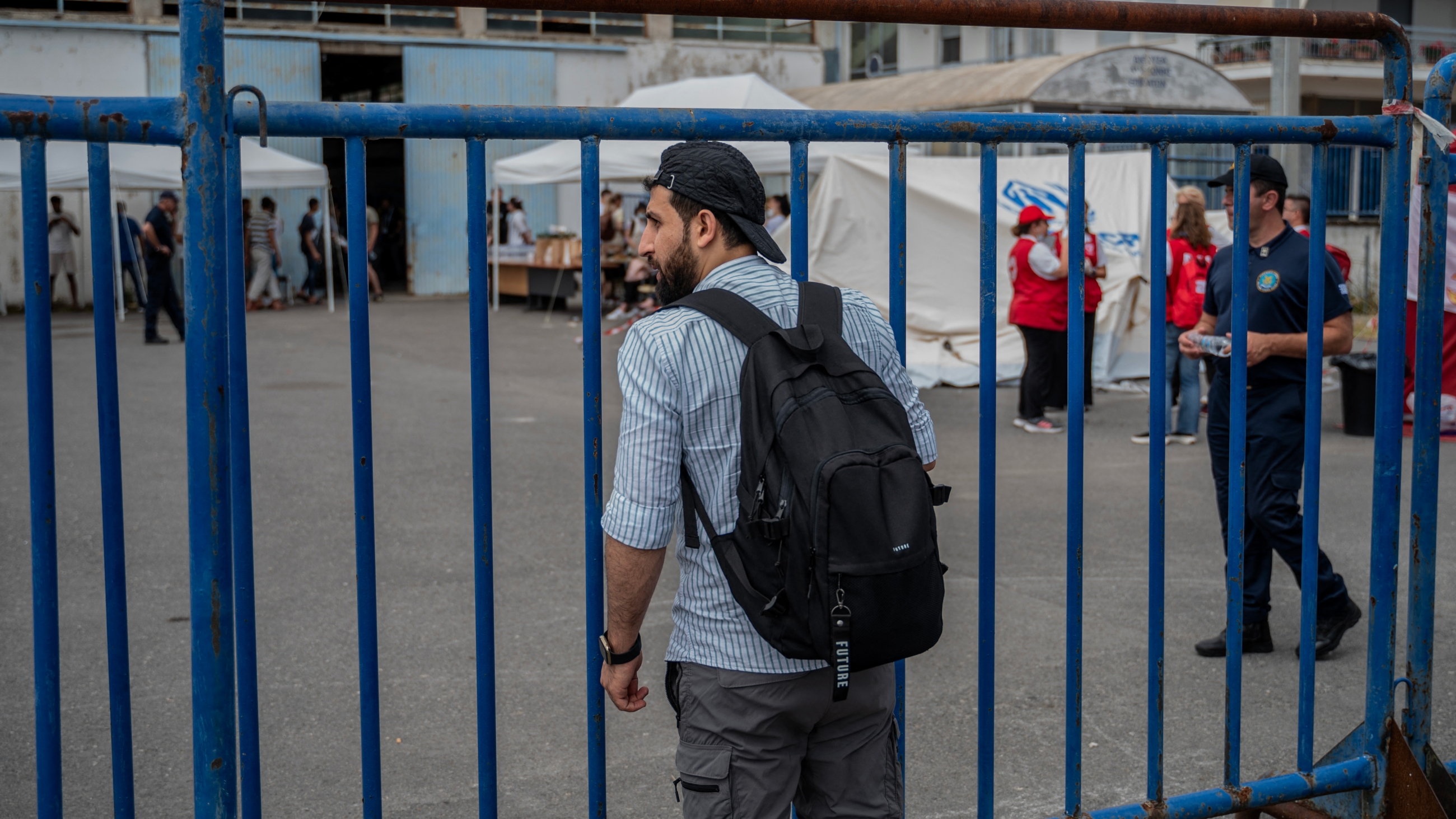
Nine Egyptian men were remanded in custody last Tuesday by a Greek court for their alleged role in the deadly Pylos shipwreck following hours of questioning.
They face charges ranging from participation in a criminal organisation to manslaughter and causing a shipwreck.
But the accusations are based on "fragile evidence”, say activists.
The shipwreck was the second deadliest refugee and migrant wreck ever recorded, according to the UN, and has left an estimated 500 missing.
The accusations are reportedly based on testimonies from nine Syrian and Pakistani survivors who identified the men as piloting the ship.
New MEE newsletter: Jerusalem Dispatch
Sign up to get the latest insights and analysis on Israel-Palestine, alongside Turkey Unpacked and other MEE newsletters
The testimonies, which emerged over the weekend, described the horrifying conditions aboard the boat in the days before the wreck, with passengers being denied food and water and those below deck being beaten if they tried to escape.
The men have pled not guilty, claiming that they paid money for their passage to Italy.
Hunger strike
Reportedly, the men were detained immediately after their rescue at the port city of Kalamata, and were refused medical attention and contact with their relatives.
Human rights activists have raised concerns over the absence of interpreters and conclusive evidence.
Moataz Zaher, an activist who is piecing together the details of the detainees, received a call from one of the men’s relatives saying that the detainees had been moved to Nafplio Prison where they have started a hunger strike.
Just after their arrests, the detainees posted a photo of their relatives' contact details scribbled on a scrap of paper on Facebook.
“Some of their relatives and friends contacted me… explaining [that they] were innocent and that they were on their way to work in Italy, so I began collecting information such as their full names, which the authorities were keen not to announce, and their status in prison.” Zaher told MEE.
So far, he has collected details for eight of the nine men; Abdullah Alhanafy, Ahmed Abdukhaleq, Moustafa Algammal, Ahmed Abbas, Islam Marzouk, Mohamed Emad Abdekmedig Elghity, Syed Ahmed Kamal al-Gharab, and Ali Emad al-Sayed al-Khouli. Zaher is still trying to find the details of the ninth detainee.
Zaher also collated and posted the relatives’ testimonies on Twitter, who all attest that the detainees, like others on the boat, paid for their passage to Italy in the hope of finding work.
“He is so young, he had just finished his exams,” Shaima Abdalhamid, the sister of one of the detainees, Islam Marzouk, told MEE.
“I can’t see how they can accuse him of being a smuggler.”
A better life
Marzouk left his home in Faqous Al Sharqiya in northern Egypt for Libya on Friday 21 April. He paid 150,000 Egyptian pounds (the equivalent of $4000 ) for his passage.
Abdalhamid described him as an ambitious young man, who had saved up to buy his own rickshaw. “He wanted to travel to build a better life,” she said. From Libya, the primary transit point for migrants trying to make it to Europe, he hoped to cross the sea to Italy.
According to Abdalhamid, there were many other men in their early 20s from the same town on the boat. In Libya, Marzouk was arbitrarily detained by smugglers in Tobruk prior to departure, in conditions “worse than prison".
'He is so young, I can't see how they can accuse him of being a smuggler'
Shaima Abdalhamid, detainee's sister
Abdalhamid heard about the wreck when panic swept through her neighbourhood in the hours following the disaster; 11 of the people on the boat had lived on her street.
Abdalhamid subsequently received 16 voice notes from Marzouk - he had managed to borrow a mobile from a search and rescue worker when he arrived in Kalamata.
“He sent them one after another, he was in a state of trauma,” Abdalhamid told MEE. “He said that the boat had capsized and that some of his friends had died but that we should tell mum he is ok.”
In the voice notes, he described how, on board the boat, the smugglers deprived them of food and water.
Abdalhamid did not hear from her brother for another seven days. She later heard reports from other survivors, now at the camp in Malakasa, that Marzouk disappeared minutes after he gave his statement to the authorities at Kalamata. As far as she is aware, he has not yet received medical attention.
Abdalhamid is still in sporadic contact with her brother. “He is in a state of shock, he doesn’t know why he is being detained and what charges he is facing at the moment… he has refrained from eating,” she told MEE.
The full details of the shipwreck remain unclear, but emerging testimonies and maritime tracking have contradicted the Greek coast guard’s version of events. They claimed that the boat was steering “a steady course” through international waters.
However, analysis of boats in the area has revealed that the vessel was not moving hours before it sank, and testimonies have described how the boat capsized following a botched attempt by the coast guard to tow it.
The nine men suspected of smuggling are awaiting a decision from the public prosecutor as to whether they will be imprisoned pending trial.
Middle East Eye delivers independent and unrivalled coverage and analysis of the Middle East, North Africa and beyond. To learn more about republishing this content and the associated fees, please fill out this form. More about MEE can be found here.


